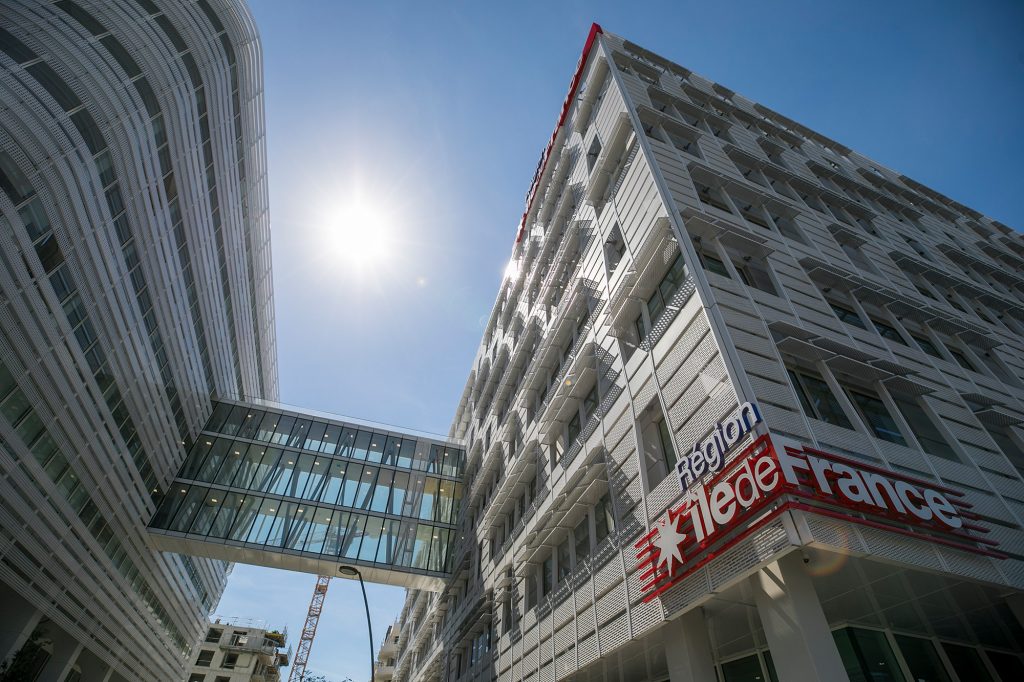Région Île-de-France: A Region Spearheading Sustainable Finance
Région Île-de-France is home to more than 12 million inhabitants — a fifth of the country’s population — and accounts for 31 percent of France’s GDP.

Headquarters of the Île-de-France Region. Photo: © Hugues-Marie DUCLOS
That makes it France’s wealthiest region; its own GDP stands at €734bn. Divided into local authorities since 1982, the French regions have seen the scope of their competences extended through decentralisation laws.
The regions are now responsible for economic development, vocational training, high school management, transport, spatial planning, environment and digital development. They are also involved in culture, sport, higher education, research and healthcare.
Région Île-de-France finds itself at the heart of things, focused primarily on economic, social and environmental development. It has dedicated 44 percent of its 2021 budget to investments, with €2bn in expenditures (excluding financial charges).
It has also shown itself to be a pioneer in the field of sustainable finance. Région Île-de-France was the first in the world, in 2012, to issue a sustainable bond in a public format and open to all investors. The move paved the way for the following years, and the market took off. It was also the first local authority in Europe to pioneer the allocating and reporting of funds for green and socially responsible projects, a process that anticipated the practices soon to become commonplace.
The regional strategy for sustainable development is broken down into a corpus of plans, schemes and measures designed to meet five objectives:
- fight climate change and protect the atmosphere
- preserve biodiversity and protect environments and resources
- enable the individual fulfilment of all people
- ensure social cohesion and solidarity between territories and generations,
- establish development dynamics based on responsible and sustainable production and consumption.
The Île-de-France region is pursuing an assertive strategy for the implementation of the Paris Agreement and Agenda 2030, and the achievement of the 17 Sustainable Development Goals (SDGs) established by the United Nations.
In March this year, Région Île-de-France published its updated framework for green, social and sustainable bond issuance. It has allowed for full transparency of its practices, maintaining leadership in sustainable finance markets as one of the first issuers to disclose alignment with the EU taxonomy. The three impact indicators selected by the region to report on the projects financed are:
- A single environmental impact indicator for all categories of green projects: CO2 emissions cut by the project
- Two social impact indicators for all categories of social projects: The creation of jobs in the construction and operational phases, including full-time posts or equivalent, and the number of beneficiaries of the project.
Vigeo Eiris (VE) provided an external review concerning the framework and has produced an independent validation, ranking it for Best Practices in three of the four pillars relating to the ICMA Principles.
To combat the economic and social consequences of the Covid pandemic, Région Île-de-France has put into placed an ambitious, three-step recovery plan.
Step I was the establishment of emergency support investments worth €1.3 bn. Step II is dedicated to the ecological and environmental transition of the region. It is based on the 192 measures resulting from the COP Île-de-France Region climate conference held in September 2020.
Step III is a multi-year investment envelope, from 2021 to 2027, mainly focused on transport, research, culture and infrastructure.
The recovery plan aims to allow various players to resume their activity after the lockdown interruptions, taking into account the impact of the crisis, and tackling the collateral issues faced by the population.
Île-de-France was the first local authority to issue a sustainability bond in a public format, in 2012, and the region committed in 2019 to 100 percent financing for green and sustainable projects.
On April 12 this year, Région Île-de-France issued a seven-year negative yield sustainable bond worth €500m, following the outstanding €800m sustainability bond issued in 2020. The 2021 transaction was the first by a European local authority to issue a sustainable negative interest rate benchmark bond on the markets.
The operation gathered 114 orders from 16 countries. Most of the bonds have been allocated to German- and French-speaking countries. Germany, Italy, Switzerland and France generated more than 60 percent of the order book. Région Île-de-France — as a regular issuer and through its updated framework — convinced investors to take part in this operation as the order book closed at €3.3Bn (close to seven times the expected amount).
The region’s financial solidity has been assessed and acknowledged by Moody’s and Fitch agencies, respectively rating it Aa2 and AA, which underscore the region’s sophisticated and prudent financial management. That expertise is particularly evident in terms of its forecasting ability, which allows Région Île-de-France to control its annual budget and debt commitments.
Since 2016, almost 100 percent of the region’s financing needs have been covered by green and sustainable borrowings, raising the attractivity of its sustainable investment policies with the international financial community.
Between 2012 and 2021, the Île-de-France region has issued more than €4.8bn in a green and sustainable format. In July 2019, the executive committed exclusively to green and sustainable financing. The outstanding regional debt could thus be 100 percent green and sustainable by 2024.
The region also commits to the best market standards. It anticipates regulation changes, as long as green projects are classified according to the environmental objectives as defined by the EU in the Taxonomy Regulation (EU Regulation [EU] 2020/852, article 9).
Région Île-de-France’s clean transport category is fully aligned with the Do No Significant Harm (DNSH) criteria defined for the corresponding economic activity in the draft Delegated Regulation and its annex (Commission Delegated Regulation supplementing Regulation (EU) 2020/852 & Annex, version published in November 2020).
You may have an interest in also reading…
Traxion: Mexican Logistics and Transport Titan that United a Fragmented Industry
Since its foundation in 2011, Traxion has evolved to become the largest and most important mobility and logistics enterprise in
Fitch Ratings: Global Perspectives, Strong Local Experience and Credit Market Expertise
Fitch Ratings, a division of Fitch Group, is a leading provider of credit ratings, commentary and research. The additional context,
Corporación Zona Franca Santiago: Forging the Next 50 Years of Sustainable Innovation and Growth
As Corporación Zona Franca Santiago (CZFS) marks its 50th anniversary, the organisation stands at the threshold of an exciting new


















































































